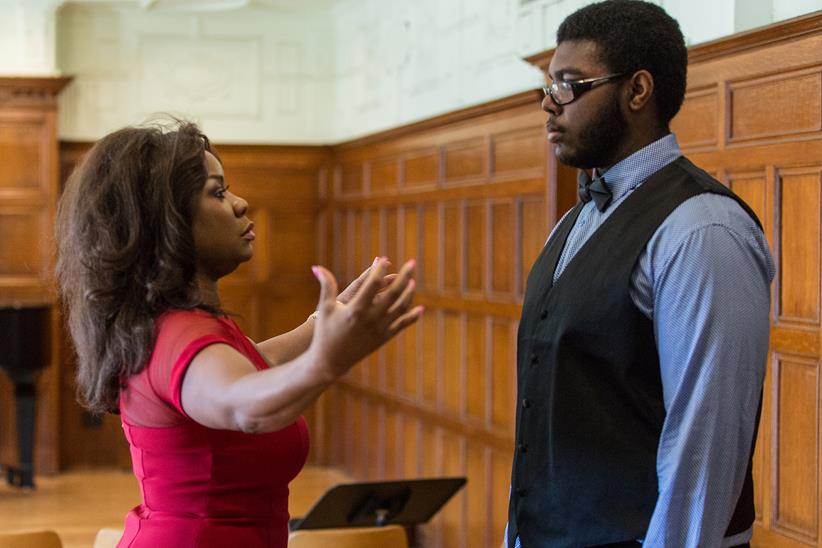Training Grounds

Opera companies’ school education efforts most often seek to expose young people to the genre and its repertory, but an increasing number have another focus, immersing students in the art form’s most basic element: singing. Company-run initiatives across the country offer vocal training to students at the high school level and below. But their missions vary as widely as the programs themselves.
Houston Grand Opera positions its High School Voice Studio as a precursor to its university-level Young Artists Vocal Academy and even to HGO Studio, its prestigious young artist program. (Think of it as a young young artist program.) Twelve students are enrolled at this year’s High School Voice Studio. Each receives weekly lessons from one of the three university-level teachers on the faculty; on top of that, they get monthly masterclasses with visiting artists and HGO staff. A special benefit this year is that some students will sing in the chorus of the world premiere of Ricky Ian Gordon and Royce Vavrek’s The House Without a Christmas Tree.
“We’re modeling it after our studio program and our vocal academy,” says Carleen Graham, director of HGOco. “In a few years, we could conceivably identify a student who is a sophomore or junior and monitor that person through high school, college and post-college, all the way into their professional life. That’s a great commitment.” [At press time, the Houston area was struggling with the devastating aftereffects of Hurricane Harvey. But — reached by phone five days after the storm hit — Graham said the 2017–2018 High School Voice Studio would proceed as planned.]
Tulsa Opera’s vocal education programs, on the other hand, don’t seek to mold the DiDonatos and Flemings of the next generation, but instead to help students develop a love of music in general — and opera in particular. The 20-year-old Tulsa Youth Opera program trains students, grades 3–12, to perform in children’s operas and as choristers in mainstage works like Tosca. The company’s Raise Your Voice! program, recently launched with funding from an OPERA America Innovation Grant, brings after-school vocal instruction to students at six middle schools in underserved neighborhoods. Tulsa Opera has designed the program explicitly to compensate for cuts to school music programs. “By getting these kids interested in singing,” says Aaron Beck, the company’s music and education administrator, “we’re trying to keep from losing another generation of music lovers.”
This summer, Florida Grand Opera staged its second Young Artist Learning Academy (YALA), an “opera boot camp” that gives students ages 15–19 a two- week immersion not just in singing, but in production and repertoire, as well. Although not as focused on a professional path as HGO’s high school vocal program, it nonetheless gives its young participants a sense of what a career in opera might entail. “It shows them ‘Yes, you can have a life in this business,’” says Rebekah Diaz- Fandrei, FGO’s director of education and community outreach.
“Before I fell in love with opera, I was more of a gospel singer,” says Johna Denis, a high school senior and a participant in this summer’s YALA. “But the camp opened my eyes to opera and the drama behind it. I would love be able to use my voice and movements to make drama onstage.”
The benefits these programs provide to young people can be immense. Take the experience of St. Louis native Mark Kent, who 26 years ago joined Opera Theatre of Saint Louis’ Artists- in-Training Program (AIT), which since 1990 has provided weekly voice lessons to talented high schoolers throughout the St. Louis region. The young baritone hadn’t intended to go to college, but his vocal training paved the way to a full scholarship at American University. After getting his master’s degree from DePaul University, he launched a career as a singer.
In 2008, detecting dwindling professional opportunities, Kent cut his singing career short. He is now president of the Biome Foundation, the fundraising arm of a St. Louis charter school. But he sees his current business prowess as an outgrowth of his life-changing experience in AIT. “What’s amazing is that the relationships I formed 26 years ago at OTSL are still intact,” he says. “Ninety-five percent of the kids in AIT won’t go on to be opera singers. But the most important thing about it is that it broadens people’s worldviews. I didn’t make it to the Met, but I’m successful in other ways.”
This article was published in the Fall 2017 issue of Opera America Magazine.

Fred Cohn
Fred Cohn is the former editor of Opera America Magazine.

Nicholas Wise
Nicholas Wise is OPERA America's senior manager of marketing and publications and the associate editor of Opera America Magazine.




